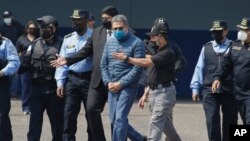Former Honduras President Juan Orlando Hernandez's trial on U.S. drug trafficking charges began Tuesday, giving a New York jury the chance to determine whether Washington's onetime key anti-drug ally actually ran the Central American country as a "narco-state."
Hernandez was close to Washington during his 2014-2022 tenure. Honduras received more than $50 million in U.S. anti-narcotics assistance and tens of millions more in security and military aid during his presidency, and he won support from former President Donald Trump for cracking down on migration.
But three months after he left office, federal prosecutors in Manhattan charged him with accepting millions of dollars in bribes from cocaine traffickers in exchange for using his position to protect them. Attorney General Merrick Garland said he abused his power to operate the country as a "narco-state."
That came nearly three years after his brother, former congressman Tony Hernandez, was convicted on U.S. drug charges and sentenced to life in prison. A prosecutor at that trial said Juan Orlando Hernandez protected his brother.
Juan Orlando Hernandez has pleaded not guilty to three counts of cocaine importation conspiracy and illegal weapons possession. He has been detained at Brooklyn's Metropolitan Detention Center since his April 2022 extradition.
He faces a mandatory minimum sentence of 40 years and up to life in prison if convicted on all counts. The trial began with jury selection on Tuesday and is expected to last between two and three weeks.
Prosecutors said that while Hernandez was campaigning in 2013, he accepted $1 million from Joaquin "El Chapo" Guzman, the leader of Mexico's Sinaloa Cartel. He used that money to bribe officials to manipulate voting results in his favor, and used similar tactics for his 2017 re-election, prosecutors said.
"This rampant corruption and massive cocaine trafficking came at a cost to the people of Honduras," Damian Williams, the U.S. Attorney for the Southern District of New York, told reporters after Hernandez was extradited.
Hernandez has argued that drug traffickers have smeared him to seek to lighten their own sentences and to extract revenge over his administration's law enforcement actions.
That argument has been used by other high-ranking Latin American officials who have been charged by the United States in recent years, including former Mexican security minister Genaro Garcia Luna, who was convicted last year on charges of taking bribes from El Chapo.
"I'm really curious to see if this is going to be a prosecution that is just going to exhibit a long list of finger-pointing at him by convicted former drug dealers, or if this is going to be a prosecution showing unquestionable evidence that he was actually involved," said Edgar Zurita, a former law enforcement official at Mexico's U.S. embassy and current managing director at investigations firm Nardello & Co.
El Chapo was himself convicted of drug trafficking in 2019 and sentenced to life in prison.
Earlier in February, two co-defendants who were initially set to be tried alongside Hernandez - his cousin Mauricio Hernandez and former Honduras national police chief Juan Carlos Bonilla - pleaded guilty to drug trafficking





